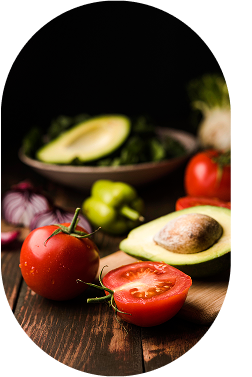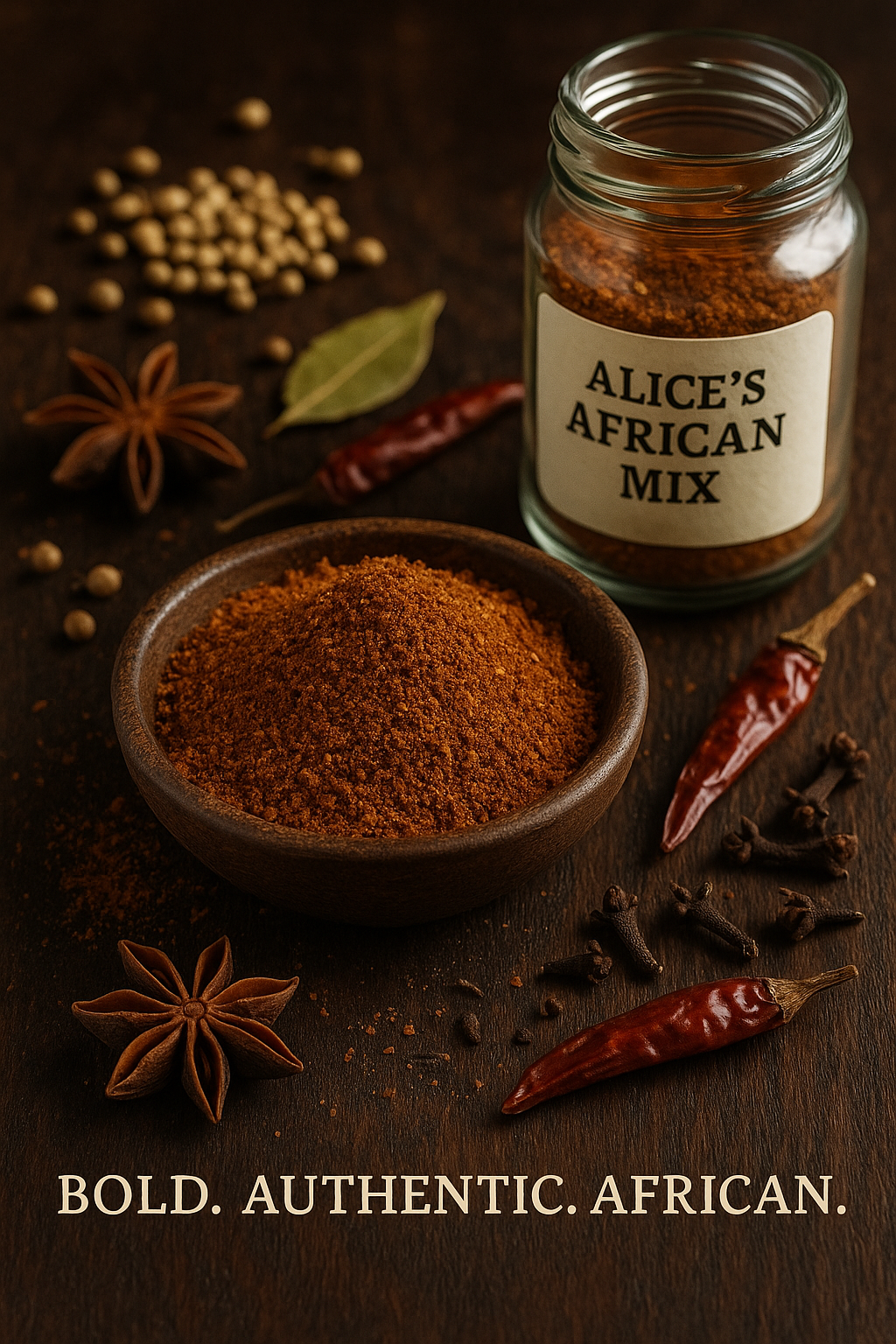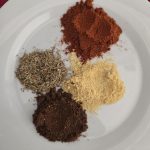Whether you’re prepping meats, seafood, tofu, or vegetables—getting the most flavor without wasting time or food is the name of the game. In this post, we’ll walk through dry rubs, wet marinades, and storage-friendly tips based on protein type, from simple to bold flavor options.
🥩 1. Meats (Beef, Goat, Lamb)
(Note: I do not cook with pork. All suggestions are based on ingredients I use personally and practically.)
Dry Rubs:
Season generously with warming spices like:
-
-
Garlic powder, black pepper, coriander, paprika, ginger
-
Optional: cloves, cumin, aniseed, and your favorite African-inspired spice mix
-
Wet Marinades:
Use a flexible base depending on how the meat will be cooked (fried, steamed, baked, or added to soups).
Common marinade bases include:
-
-
Homemade ginger-garlic-onion paste (my go-to seasoning base)
-
Acidic components like lemon juice or vinegar
-
Oil (vegetable, avocado, or olive oil)
-
-
-
Yogurt (for tenderness and a mild tang—great for grilling or roasting)
-
Fresh herbs and spice blends
-
Marination Time:
-
-
Recommended: 2 to 4 hours
-
-
-
Best: Overnight (up to 24 hours)
Avoid marinating more than 48 hours to prevent mushy texture, especially with acidic bases.
-
Storage Tips:
-
-
Batch & freeze raw marinated meat in portion sizes
-
-
-
Flash freeze (spread flat on a tray or inside a freezer-safe container first), then transfer to labeled zip-top bags—this makes it easier to grab single portions without defrosting the entire bag
-
-
-
Cooked meat: Store in the fridge for up to 4 days
-
Allergy Notes:
-
-
Avoid spice mixes with bouillon if MSG or sodium is a concern
-
-
-
Check for allergen content in store-bought sauces or yogurt (e.g., dairy, soy)
-
-
-
Always label freezer bags with ingredients in case of household allergies
-
🍗 2. Poultry (Chicken, Turkey)
Dry Rubs:
Try combinations with dried thyme, rosemary, curry powder, garlic, onion powder, or poultry spice blends.
Wet Marinades:
Base: lemon juice, plain yogurt, or vinegar
Add-ins: mustard, ginger, turmeric, oil
Marination Time:
-
-
Minimum: 2 hours
-
-
-
Best: 6–12 hours
-
Storage:
-
-
Freeze raw poultry with marinade in zip bags
-
-
-
Avoid marinating more than 48 hours (acid breaks down meat)
-
🐟 3. Seafood (Fish, Shrimp, Shellfish)
Dry Rubs:
Use lighter blends with lemon zest, garlic, black pepper, smoked paprika, and esoro wisa (optional).
Wet Marinades:
Base: citrus juice, vinegar, or palm vinegar
Herbs: fresh parsley, cilantro, garlic, pepper, olive oil
Marination Time:
-
-
Fish: 15–30 mins
-
Shellfish: 10–15 mins
-
Stretch Tip:
Too much acid makes seafood mushy—stick to short marinades.
Storage:
-
-
Marinate just before cooking
-
-
-
Cooked: Refrigerate up to 2 days
-
🌱 4. Tofu & Plant-Based Proteins
Dry Rubs:
Use smoked paprika, turmeric, onion powder, cumin, coriander, cayenne or chili powder.
Wet Marinades:
Base: soy sauce, sesame oil, vinegar, or coconut milk
Flavor boosters: garlic, ginger, lime, peanut butter
Marination Time:
-
-
Firm tofu: 30 mins to overnight
-
-
-
Tempeh: 1 hour
-
Stretch Tip:
Press tofu before marinating for better absorption.
Storage:
-
-
Marinate and freeze tofu raw
-
-
-
Cooked: Store up to 4 days
-
🥕 5. Vegetables
Dry Seasoning:
Toss with oil + spices like curry, garlic powder, chili flakes, thyme, or suya spice mix.
Wet Marinades:
Quick pickles or spice-infused oils (e.g., olive oil + herbs + lemon zest)
Marination Time:
-
-
Root veggies: 30–60 mins
-
-
-
Leafy/soft veggies: 10–20 mins
-
Storage:
-
-
Pre-seasoned veggies can be frozen before roasting
-
-
-
Store cooked up to 4 days
-
🧊 Stretch Tips Recap (for ALL Protein Types)
-
-
Batch & freeze seasoned raw proteins in portions
-
-
-
Label and date all marinades and spice mixes
-
-
-
Use ice cube trays for frozen garlic/ginger paste or citrus juice
-
-
-
Make bulk dry rubs and store in airtight jars
-
-
-
Always keep an eye on freshness—spoilage = wasted money
-
Why Make Your Own Marinades? Time, Flavor & Control.
When it comes to seasoning and marinating meats, nothing beats the balance of saving time while boosting flavor—and the easiest way to do that is by making your own marinades.
It’s simple, healthy, and highly recommended.
Why? Because you know exactly what’s going into your food.
Homemade marinades let you:
-
-
Customize to your taste and dietary needs
-
-
-
Avoid hidden sugars, preservatives, and allergens
-
-
-
Save money by using pantry staples like garlic, ginger, herbs, and oils
-
Prep ahead for quick weeknight meals
-
While grocery shopping, make it a habit to read labels—see what’s in your favorite store-bought sauces, and then mimic or improve it at home. You’ll find that once you start making your own blends, you’ll never want to go back.
Easy Examples: Season Like a Pro—No Fancy Tools Needed
Making your own seasoning blends is simpler than you think—and once you try it, you’ll never look at that store-bought garlic salt the same way again.
Here are a few quick examples to get you started:
🧄 Homemade Garlic Salt
No need to buy a bottle—just mix:
-
-
1 part garlic powder
-
-
-
3 parts salt
-
-
-
Optional: add parsley flakes for color
-
Use it to season meats, roasted vegetables, or pop-corn!
DIY Italian Seasoning: Tired of buying blends with anti-caking agents or “natural flavors”? Try this:
1 Tbsp dried basil Tbsp dried oregano
1 Tbsp dried thyme
1 tsp garlic powder
Pinch of chili flakes (optional)
✨ Bonus Stretch Tip:
Make a small batch to test the flavor and adjust to your taste. Once you’ve nailed your version, mix a bigger jar and label it for next time.
Remember: Your kitchen, your rules. You can simplify or spice things up as you like—and save money while you’re at it!
Want to Go the Extra Mile? You can even buy fresh herbs and dry them yourself for later use. It’s cost-effective, reduces waste, and adds a homemade touch to every meal.
-
-
-
Air-dry bunches of thyme, basil, or rosemary by hanging them upside down in a cool, dry spot
-
Oven-dry at low heat (around 170°F / 75°C) for faster results.
-
Dehydrate with a food dehydrator if you have one
-
Once fully dried, crumble and store in airtight jars—ready for your next homemade seasoning blend. It’s one more way to stretch your groceries, save money, and stay in control of your ingredients.
-
-
Final Thoughts: Small Steps, Big Flavor Seasoning and marinating aren’t just about taste, it’s about making the most of what you have, saving time, and stretching every ingredient to its full potential.
Whether you’re prepping meat, tofu, seafood, or veggies, the Stretch Pantry way reminds us that flavor doesn’t have to be complicated or wasteful.
❤️Stretch Pantry Health Tip: The more you season at home, the more control you have over your health. By making your own spice blends and marinades, you can cut back on sodium, sugar, and processed additives—while still eating well and loving every bite.
See you next time in the Stretch Pantry kitchen—where we keep saving time, boosting flavor, and making food work smarter for you.
With Love and Spice,
Alice – Creator of The Stretch Pantry
Want to keep this in your kitchen for quick reference?👉 Click here to download the Ginger-Garlic-Onion Paste Recipe Card (PDF)
This printable recipe card is perfect for batch prep and flavor-packed meals. Add it to your binder or meal planning station!







.png)
.png)

.png)
.png)